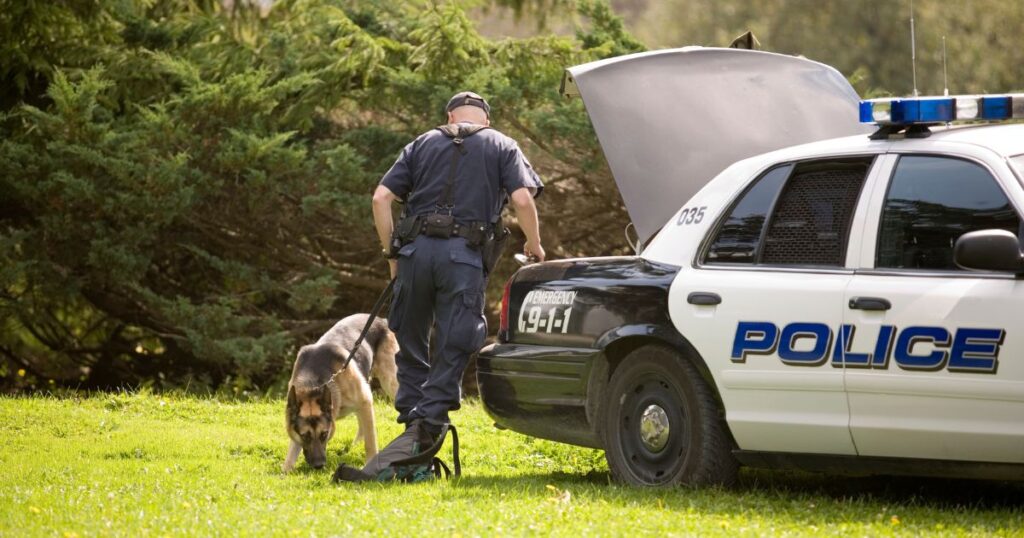The legal and cultural perception of cannabis has significantly evolved in recent years. Florida’s latest court ruling highlights this transformation by addressing a critical question regarding the use of police dogs in vehicle searches. For the first time, Florida judges have determined that a drug-sniffing dog trained to alert on cannabis cannot be the sole justification for a warrantless vehicle search. This decision not only reflects the shifting legal framework around cannabis but also strengthens protections for individuals abiding by medical marijuana laws.
What Prompted the Ruling?
The case revolves around a 2020 incident in Groveland, Florida, as reported by News4Jax, where a Lyft vehicle was stopped for speeding and malfunctioning tag lights. A police officer brought Polo, a drug-sniffing dog, to inspect the car. Polo alerted to potential drugs, leading officers to search the vehicle and find cannabis along with harder substances such as crack cocaine, methamphetamine, and ecstasy.
The passenger, Stephon Ford, sought to suppress the drug evidence, arguing that Polo’s alert could not differentiate between illegal marijuana, medical marijuana, or hemp—substances that are treated differently under Florida law. While the initial circuit court denied Ford’s motion to suppress the evidence, a three-judge appeals court reversed that judgment.
- Cannabis Legalization Creates Ambiguity – Chief Judge James Edwards emphasized that Polo’s alert couldn’t be conclusive because the officers had no way of knowing whether the substance detected was illegal cannabis, medical cannabis (legally obtained by cardholders), or legal hemp.
- Probable Cause Requirements – The ruling stated that Polo’s alert alone wasn’t sufficient to establish probable cause for a search, especially in the context of Florida’s legal medical marijuana framework.
- First of Its Kind – The decision, described as one “of first impression,” sets a precedent within Florida’s 5th District Court of Appeal, covering areas like Daytona Beach, Jacksonville, and Ocala.
Judge Jordan Pratt concurred, stating that dogs trained to alert on cannabis can no longer serve as the sole basis for warrantless searches. However, he added that alerts can still contribute to probable cause when accompanied by officer questioning or specialized canine training.
Implications of the Ruling For Florida Cannabis
This decision holds significance for several reasons.
Policing Practices When It Comes to Medical Marijuana
The role of drug-sniffing dogs may undergo a transformation. To adapt to this ruling, law enforcement agencies may need to train their canine units to differentiate between cannabis and other substances. Alternatively, officers may need to combine a canine alert with proactive questioning to rule out legal possession of marijuana.
Shifting Legal Challenges
The ruling highlights the “collateral consequences” of cannabis legalization. Since Florida voters approved medical marijuana in 2016, the state has been navigating how to balance new cannabis laws with existing frameworks for policing and public safety. While cannabis remains federally illegal and recreational use, which failed to pass in the last election cycle, means recreational use is still banned in Florida, these local rulings reflect the complexities of applying laws to practices shaped in the cannabis prohibition era.
Privacy Protections for Citizens
For individuals lawfully using medical marijuana, this decision strengthens protections against unreasonable searches. By requiring more than just dog alerts to establish probable cause, Florida courts ensure that law-abiding cannabis users aren’t unfairly penalized.
A Ripple Effect Across the State
While this ruling currently applies to Florida’s 5th District, it could set the stage for similar decisions across other jurisdictions across Florida.
Why This Matters for Cannabis Legislation
Cannabis legalization is often accompanied by wide-ranging legal and societal changes. The Florida appeals court’s decision is an example of institutional adaptation to new cannabis laws. It shows that authorities now recognize cannabis detection, once treated as conclusive evidence for a search, as a more nuanced issue.
This ruling also reflects a “common-sense” approach to legalization.The legalization of medical marijuana aimed to improve public access to cannabis for legitimate medical needs—not to subject lawful cardholders to unnecessary searches and scrutiny.
This Florida ruling also aligns with a broader national trend of reassessing outdated laws and enforcement mechanisms in light of cannabis legalization. With medical marijuana now legal in 38 states and recreational use permitted in 24 states, existing legal and policing practices are facing an overdue modernization.
Policing reforms and updated training standards could ultimately help ensure that enforcement focuses on actual criminal behavior rather than creating added hurdles for cannabis users abiding by the law.
Celebrating Progress For Florida’s Cannabis Industry, Preparing for the Future
This ruling is a positive step forward for Florida’s cannabis community. It also serves as a reminder that as cannabis legalization continues to advance, legal systems must evolve to keep pace with public policy and common sense. The adoption of legal cannabis changes everything from traffic stops to the development and deployment of detection technology.
For cannabis advocates and legal professionals alike, this decision reflects the kinds of changes that can lead to greater fairness and clarity in the law. If you’re a medical marijuana cardholder or a cannabis advocate, this decision may feel like validation of the progress made so far—and a sign that more work lies ahead to fully harmonize cannabis legalization with established legal systems.

















